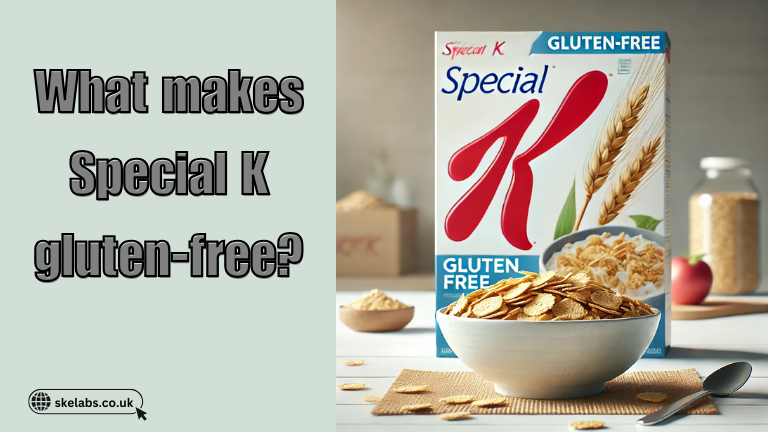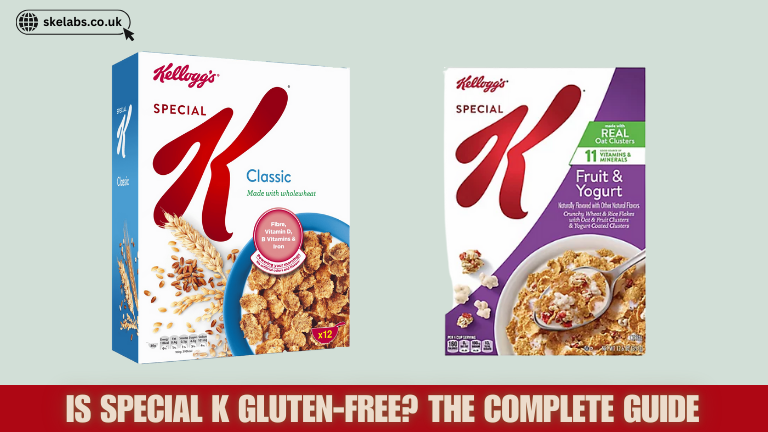Breakfast options can be difficult to find when you are trying to follow a gluten-free lifestyle. Special K is a popular cereal by Kellogg. Is Special K gluten-free? This article will examine this question in depth, examining the ingredients, manufacturing process, and alternative options. This article is for anyone who has celiac or follows a gluten-free diet.
Does Special K contain gluten?
Special K is a popular cereal around the world, but not all varieties are gluten free. Standard Special K is primarily made from barley, wheat and rice. All of these grains contain gluten. The original Special K cereal is not Gluten-free, and should be avoided if you have celiac or gluten sensitivity.
Common Ingredients of Special K
- Rice A common grain found in gluten-free breakfast cereals. Special K is a good example.
- Wheat This is the main ingredient in Special K and unfortunately wheat contains gluten.
- Barley Another gluten-containing product found in Special K products.
What makes Special K gluten-free?

Kellogg’s makes gluten-free versions of Special K, which is a cereal that contains gluten. Special K Gluten Free is made using different ingredients in order to make it safe for those who can’t consume gluten. Special K gluten-free contains the following ingredients:
- Rice, and corn are both naturally gluten-free grains and the basis for gluten-free versions.
- Tapioca Starch is often used to give gluten-free cereals a more textured and consistent consistency.
To ensure that the cereal is gluten-free, it’s important to check the packaging. Special K Gluten Free is free of wheat and barley. The risk of contamination is reduced through the careful manufacturing process. Always check the labels and certifications of gluten-free products to make sure you’re getting a genuine product.
How can you tell if Special K is safe for you?
It is important to be careful when buying products that are labeled gluten-free for those with celiac or severe gluten sensitivities. Special K does have gluten-free products, but you should check these things:
- Certified Gluten-Free label: Ensure that the product is certified by a recognized organization such as the Gluten-Free Certification Organization.
- Ingredients list: Check the ingredient list for any traces of wheat, rye or barley. These are the main sources of gluten.
- Risk of Cross-Contamination Even if a product is gluten free, it’s possible that cross-contamination occurs during production. Some facilities may process gluten-free products as well as gluten-containing ones, which can result in trace amounts in the final product. Choose products that adhere to strict guidelines for preventing cross-contamination.
Special K safe for people with Celiac Disease
Celiac disease, a serious autoimmune condition that requires a strict gluten-free diet, is a serious disorder. Even traces of gluten can trigger adverse reactions. Although some Special K products may be labeled as gluten-free by the manufacturer, celiac patients should still exercise caution.
- Gluten Free Certification: Verify that the product has been certified by an organization of repute.
- Cross Contamination Even gluten-free products may be at risk of contamination. Check the label for any disclaimers or warnings about gluten cross-contact.
- Reputation of the Brand: Brands specialized in gluten-free food are better equipped to meet the needs and requirements of celiac patients, thus ensuring a safe product.
It’s safer to select a cereal that is specifically made for celiac patients, since these products are produced in gluten-free facilities.
What is the risk of cross-contamination?
When a food product comes into contact during production with gluten-containing items, cross-contamination can occur. Special K is a well-known cereal brand that processes both gluten-free products and gluten-containing products, increasing the risk of cross-contamination. Consider the following to minimize the risk:
- Choose Gluten-Free Certified Products These products are tested rigorously to ensure that no gluten is found in the final product.
- Look for Cross-Contamination Warnings Some products include a warning that they were produced in an establishment that processed wheat. To make an informed decision, always read the labels.
It is best to avoid contaminating cereals if you have celiac or severe gluten sensitivities.
Also Check: What Is Mulberry Silk? Benefits and Care Explained Simply
What are the best gluten-free cereal alternatives?
There are many gluten-free alternatives to Special K if you decide it’s not the right choice for your diet. These gluten-free alternatives have been certified to meet the standards required by individuals with celiac or gluten sensitivity. Here are some popular choices:
- Cheerios : Many Cheerios varieties are gluten-free, and have a mild, crunch texture.
- Rice Chex : Rice Chex, a popular cereal made with rice without gluten grains or other grains is gluten-free.
- Kellogg’s Rice Krispies Gluten Free: A gluten free version of the popular Rice Krispies made without barley and wheat.
- Nature’s Path This brand offers gluten-free cereals that are made from whole grains like quinoa and rice.
You can find these alternatives in most grocery stores. They are specially designed for people who avoid gluten.
FAQs
Does Special K contain gluten?
Most Special K cereals contain gluten. Some varieties of Special K cereals are gluten-free. Check the packaging to be sure.
What’s the difference between gluten-free Special K and regular Special K?
Gluten is found in wheat. Rice, corn and other gluten-free products are used in the gluten-free version.
Can celiacs eat Special K?
Gluten is a problem for people with celiac. Celiac patients should only consume the gluten-free certified versions.
Can I tell if the Special K cereal is gluten-free by looking at its label?
Check the label to ensure that it is gluten-free. Also, check the ingredient list to see if there is any wheat, rye, or barley.
Why is Special K gluten-free in some versions?
Special K standard is made from wheat and barley which both contain gluten. Special K also offers gluten-free options made from rice and corn.
conclusion
Kellogg’s, however, offers a gluten free version of Special K cereal made from rice and corn. Check the label to make sure that a product is gluten-free. This is especially important if you suffer from celiac or gluten sensitivity. Consider alternatives to avoid cross-contamination. Making informed decisions will allow you to continue eating breakfast without risking your health.

